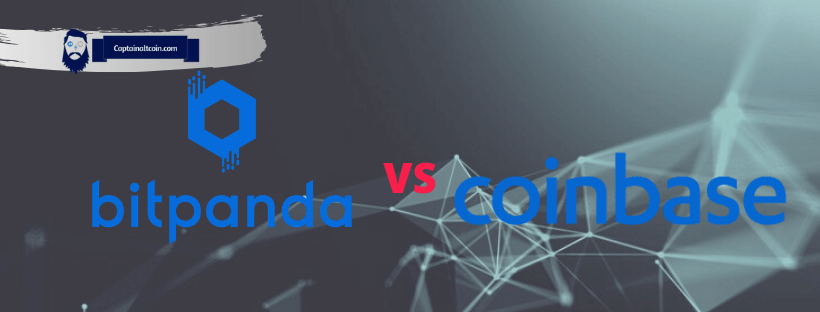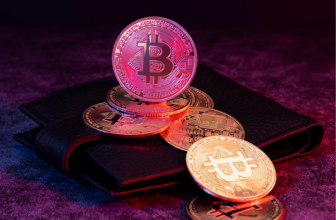
When it comes to top cryptocurrency exchanges, Coinbase is arguably the king while Bitpanda is one of the leading insurgents that is gunning for the throne.
Hence we went into yet another exchange comparison putting Coinbase and Bitpanda to a test and see who comes out as a winner.
Without further ado, here is our Coinbase vs Bitpanda head to head battle.
Visit Coinbase Now Visit Bitpanda Now
What you'll learn 👉
Coinbase vs Bitpanda: General info
Coinbase was launched in 2012 in San Francisco, California. As a company operating in the United States, Coinbase is required to comply with U.S. laws and regulations, including state money transmission laws and regulations, the USA Patriot Act, the Bank Secrecy Act, and is registered with FinCEN as a Money Services Business. These laws and regulations force accountability onto Coinbase. This is something that may be lacking from some of their offshore competitors in other countries with less strict regulations. It is widely considered as one of the best crypto exchanges in the market.
Bitpanda is a cryptocurrency exchange that specializes in buying and selling Bitcoins worldwide but with special focus on Eurozone. The company was started in late 2014 and has since seen a huge growth and became one of the more popular platforms for purchasing Bitcoins around Europe.
Bitpanda Fees vs Coinbase
Coinbase charges around 3.99% for credit/debit card purchases and 1.49% for bank transfer purchases.
| Purchase Method | Coinbase Fees |
| U.S. Bank Account | 1.49% ($0.15 minimum) |
| Coinbase Wallet (U.S. Dollars) | 1.49% |
| Credit Card or Debit Card | 3.99% |
With Bitcoin fees at 1.49% (buy) and 1.29% (sell), Bitpanda is one of the cheapest cryptocurrency exchanges for buying and selling Bitcoin instantly.
Buying Limits
Coinbase does not clearly define limits for new users on their site. Instead, limits can vary depending on your country, account verification, buying history, and account age. To apply for higher limits you will have to verify your identity. Once you do, a fully verified US residents can transaction up to $50,000 per week, while verified customers from EU may have a maximum of $30,000 in their account at any time. You can check their limits through their account.
Buying limits are highly dependent on the type of account you have – is it light verified or verified. Also, method of payment plays a role as well.
Light verified accounts: they can’t deposit or withdraw anything with credit cards or Zimpler. They can only use bank transfer and have a daily limit of 50k€ for deposit and 500k for withdrawal.
Fully verified accounts:
NETELLER and Skrill: After successful full verification, the 24-hour limit for NETELLER and Skrill deposits is 10,000 EUR and cannot be increased any further.
Credit card, iDEAL and Zimpler: After successful full verification, the 24-hour limit for credit card, iDEAL and Zimpler deposits is 2,500 EUR and cannot be increased any further.
Bank transfer (SEPA): After successful full verification, the 24-hour limit for bank transfers (SEPA) deposits is 49,999 EUR.
Supported Countries
Coinbase serves customers in the following countries:
Australia, Austria, Belgium, Bulgaria, Canada, Croatia, Cyprus, Czech Republic, Denmark, Finland, Greece, Hungary, Ireland, Italy, Jersey, Latvia, Liechtenstein, Malta, Monaco, Netherlands, Norway, Poland, Portugal, San Marino, Singapore, Slovakia, Slovenia, Spain, Sweden, Switzerland, United Kingdom and the United States.
The Bitpanda Global Exchange allows worldwide crypto-to-crypto trading in 54 countries (USA and China not included due to regulatory reasons). Fiat money deposits in Euro directly to the Bitpanda Global Exchange are possible in 54 countries (the whole EU plus Iceland, Liechtenstein, Norway, Switzerland, Monaco, Argentina, Australia, Brazil, Canada, Colombia, Egypt, Georgia, Hong Kong, Israel, Jamaica, Japan, Malaysia, Mexico, Peru, Philippines, Singapore, South Africa, South Korea, Taiwan and Tunisia).
Supported coins
Currently, coins listed on its non-Pro interface include Bitcoin, Bitcoin Cash, Ethereum, Ethereum Classic, USD Coin, XRP, Stellar, Zcash, 0x, Litecoin, and the Basic Attention Token.
Bitpanda’s offering of coins keeps growing by month. Right now it supports all the major coins like Bitcoin, Litecoin, Ethereum, DASH, XRP, BCH, IOTA, EOS, ADA, Tron, LINK, BAT, Lisk, Waves, Cosmos, ETC, NEO, Tezos, ZCASH, XLM, Augur, 0x, OMG and their native tokens BEST and Pantos.
Deposit and Withdrawal methods
Coinbase offers 3 payment methods: Debit card, bank account, or wire transfer. In this guide we will cover purchasing with a debit card or with a bank account.
As for withdrawal methods – you have one additional way to get your money from Coinbase by using PayPal.
Verified users can use a host of different solutions to deposit fiat money into Bitpanda. These are: SEPA, GIROPAY/EPS, iDEAL, SOFORT, NETELLER, Skrill, Zimpler, Visa, and Mastercard to their Euro Wallet. Bitpanda To Go vouchers can be redeemed for cryptocurrencies directly.
Verified accounts can deposit with Skrill, Visa, and Mastercard to their USD Wallet.
As for withdrawals, EURO users can withdraw with SEPA, amazon.de, NETELLER, and Skrill while USD users can use Skrill.
Customer Support
Coinbase customer support is handled through email, and in our personal experiences, we’ve typically received responses from support within 24-72 hours. They also have an extensive FAQ for general questions.
Their customer support is email based and pretty much in line with industry expectations when it comes to speed and efficiency. Meaning, good enough with room for improvement.
Bitpanda does have a comprehensive support helpdesk where you have tons of frequently asked questions & answers.
Trust and reputation
Coinbase enjoys an excellent reputation and trust as a registered and regulated company with well-known VCs as investors, transparent team and immaculate track record (with minor, anecdotal complaints from individual customers).
Coinbase is a Bitcoin company based in San Francisco, which means that is required to comply with US laws and regulations, at both a federal and state level. Here are some of the regulatory bodies, laws, and regulations that Coinbase complies with:
- It complies with state money transmission laws and regulations.
- It complies with the USA Patriot Act.
- It complies with the Bank Secrecy Act.
- It is registered with FinCEN as a Money Services Business.
Bitpanda worked for a long time without any official license and with an unclear regulatory status. However, in April 2019, Bitpanda received a Payment Services Directive 2 (PSD2) license from the Austrian Financial Market Authority. The license allows Bitpanda to provide payment and new fintech services in the Euro zone.
Security
Coinbase segregates customer funds from company operational funds. These customer funds are held in custodial bank accounts. This means they will not use funds of yours to operate their business. They also claim, “Even if Coinbase were to becomes insolvent, the funds held in the custodial bank accounts could not be claimed by Coinbase or its creditors. The Funds held in those accounts would be returnable to Coinbase’s customers.”
98% of customers’ cryptocurrency funds are stored in secure offline cold storage. These cryptocurrencies are held on multiple hardware wallets and paper wallets. The physical cryptocurrency wallets are then stored in vaults and safety deposit boxes around the world. These measures protect customers’ funds from being lost or stolen by hackers.
The remaining portion of cryptocurrency, that is stored online, is fully insured by a syndicate of Lloyd’s of London.
Bitpanda likes to emphasize that they have never been hacked, implying their superior security system. The exchange has mandatory know your customer (KYC) and anti-money laundering (AML) verification. Crypto assets are held in cold storage while you personally have couple of options to increase account security on Bitpanda by enabling 2FA and make sure to check you are always on the actual Bitpanda site (and not on some copycat scam website).
Other features
Coinbase has seen a rapid growth and branched out into different sectors of cryptocurrency world with most of their new services being geared for institutional clients. Those new services are Coinbase Custody, Coinbase Prime, Coinbase Staking.
Additionally, Coinbase has their Coinbase Pro platform designed for day-traders and their own wallet that is also a Web3.0 browser.
Bitpanda emulates bigger players like Coinbase or Binance in a lot of their moves: they launched their own token with similar incentive structure around it to what Binance setup around BNB, they also launched Bitpanda staking, Swaps, metals and a lot of other services around digital assets.
Coinbase vs Bitpanda: Pros and Cons
Coinbase Pros ✔️
- Excellent Reputation
- FDIC Insured
- Easy to Use
- Very Secure
- Accepts Credit / Debit Cards
Coinbase Cons ❌
- Slow Customer Support
- Limited Currencies Available
Bitpanda Pros ✔️
- Wide variety of payment methods
- Great for beginners
- Very low fees
- Great security
- Website is modern, neat and fully functional
Bitpanda Cons ❌
- Fees aren’t explicitly stated
Coinbase vs Bitpanda: Conclusion
So who wins the battle between Bitpanda and Coinbase?
- In terms of fees – Bitpanda is is better and cheaper even though they are not fully transparent about fee costs (they incorporate the fees in the overall amount to be paid)
- In terms of supported currencies – it is a tie as both support around 15 coins with Bitpanda having a slight edge as they outpace Coinbase in adding new coins.
- In terms of regulatory compliance and licensing: Coinbase holds an upper hand but Bitpanda is also regulated and legit company.
- In terms of customer support: Both are of similar quality so it is a tie.
- When it comes to security in the Bitpanda vs Coinbase battle: Both are top notch with no record of security breaches so it is another stalemate.
- Trading features: Bitpanda comes out as a winner in this category as they have more advanced trading interface.
- Overall reputation: another tie since both enjoy fairly good reputation in crypto community with sporadic complaints by individual customers.
If you are not fond of neither of these exchanges, here is a list of potential alternatives: Cex.io, Coinmama Binance, Changelly, Bitfinex, Kraken, Bittrex, Bitstamp.
In case you want to compare Coinbase or Bitpanda with other exchanges, have a look at our guides where we do just that:







